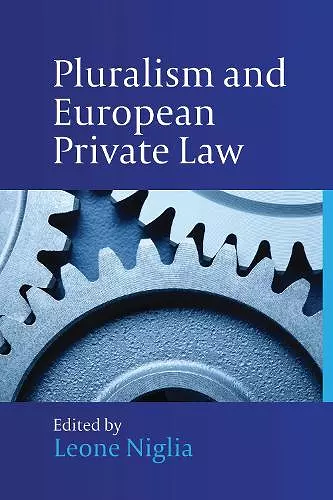Pluralism and European Private Law
Format:Hardback
Publisher:Bloomsbury Publishing PLC
Published:29th Jan '13
Currently unavailable, and unfortunately no date known when it will be back

European private law has hitherto tended to be conceptualised firmly around ideas of unity and harmony. Yet the discourse within other areas of European law, notably constitutional law scholarship, visibly adopts pluralist perspectives. This book seeks to bridge the gap between 'public' and 'private' law by looking at European private law from various pluralist positions and by investigating old and new ways in which to understand legal pluralism in general. It fills a gap in the wide literature on legal pluralism, as the first book entirely dedicated to offering an insight into legal pluralism from the vantage point of the private law domain. The book addresses critically issues such as what pluralism really means in private law and what conceptions of pluralism it embodies, including discussion about the outer boundaries of any of the pluralist understandings. Contributions address comparative, critical, historical, theoretical and normative aspects. The book provides an opportunity to engage innovatively with problematic conceptual issues which inform the work of European private law scholars, including the debate on the Common Frame of Reference Poject of the European Commision.
...essential reading for those interested in the subject of the Europeanisation of private law. -- Pierre Bouvier * Agence Europe's Daily Bulletin No 10853 *
In the prologue to the collection of essays, Niglia explains the book’s aim to propose “reflection on a path towards awareness and action”. This approach calls to mind Mangabeira Unger’s agenda for “legal analysis as institutional imagination”, which promotes a method of mapping developments in law, combined with a process of criticism aimed at redefining societal ideals and imagining institutional structures for their fulfilment. In a similar vein, Niglia seeks to raise awareness of the plural condition of European private law, understood as the coexistence of territorial (domestic) private law orders with post-territorial, functional orders (European and global).
Collections of essays usually run a certain risk of conveying disunity rather than a harmonized picture of the theme to which they relate; different perspectives and styles of authors might confuse a reader as to what the overall message of the book is. A work on pluralism may even be more vulnerable to such defects than books on more clearly or uniformly defined themes. By adding a prologue and epilogue, as well as insightful introductory overviews to the three parts of the work, however, Niglia shapes the context within which the individual chapters may be read and understood. He emphasizes the plurality of different conceptions of European private law pluralism, lists the different visions on conflict resolution (or settlement, or accommodation) provided by various authors, indicates how the language of pluralism may serve to facilitate a discourse among disciplines, and stresses the important normative questions posed by legal pluralism in the field of European private law. Although this grammar of pluralism is undoubtedly influenced by the editor’s views on the general theme, it serves well to provide a common language within which to redefine and discuss developments in European private law and engage with the variety of views held by different authors in the field.
ISBN: 9781849463379
Dimensions: 234mm x 156mm x 14mm
Weight: 616g
294 pages